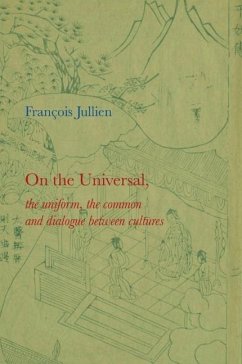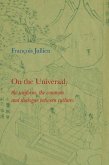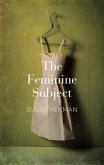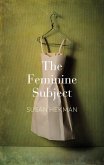François Jullien, the leading philosopher and specialist inChinese thought, has always aimed at building on inter-culturalrelations between China and the West. In this new book he focuseson the following questions: Do universal values exist? Is dialoguebetween cultures possible?
To answer these questions, he retraces the history of the conceptof the universal from its invention as an aspect of Romancitizenship, through its neutralization in the Christian idea ofsalvation, to its present day manifestations. This raises thequestion of whether the search for the universal is a uniquelyWestern preoccupation: do other cultures, like China, even have anotion of the universal, and if so, how does it differ from ours?Having considered the meaning of the concept in the East and West,Jullien argues that, if communication between cultures is to bemeaningful, facile assumptions of universal values and complacentrelativism need to be examined. It follows, therefore, thatdialogue between cultures should not begin with issues of identityand difference, but rather by considering divergence and profusion.By no longer simply assuming universality, we allow for greaterself-reflection.
This wide-ranging and engaging study will be of particular interestto students and scholars of philosophy and of Chinese culture andsociety. It will also appeal to a wider readership interested incontemporary thought and the challenges of communication betweenEast and West.
Hinweis: Dieser Artikel kann nur an eine deutsche Lieferadresse ausgeliefert werden.
To answer these questions, he retraces the history of the conceptof the universal from its invention as an aspect of Romancitizenship, through its neutralization in the Christian idea ofsalvation, to its present day manifestations. This raises thequestion of whether the search for the universal is a uniquelyWestern preoccupation: do other cultures, like China, even have anotion of the universal, and if so, how does it differ from ours?Having considered the meaning of the concept in the East and West,Jullien argues that, if communication between cultures is to bemeaningful, facile assumptions of universal values and complacentrelativism need to be examined. It follows, therefore, thatdialogue between cultures should not begin with issues of identityand difference, but rather by considering divergence and profusion.By no longer simply assuming universality, we allow for greaterself-reflection.
This wide-ranging and engaging study will be of particular interestto students and scholars of philosophy and of Chinese culture andsociety. It will also appeal to a wider readership interested incontemporary thought and the challenges of communication betweenEast and West.
Hinweis: Dieser Artikel kann nur an eine deutsche Lieferadresse ausgeliefert werden.








